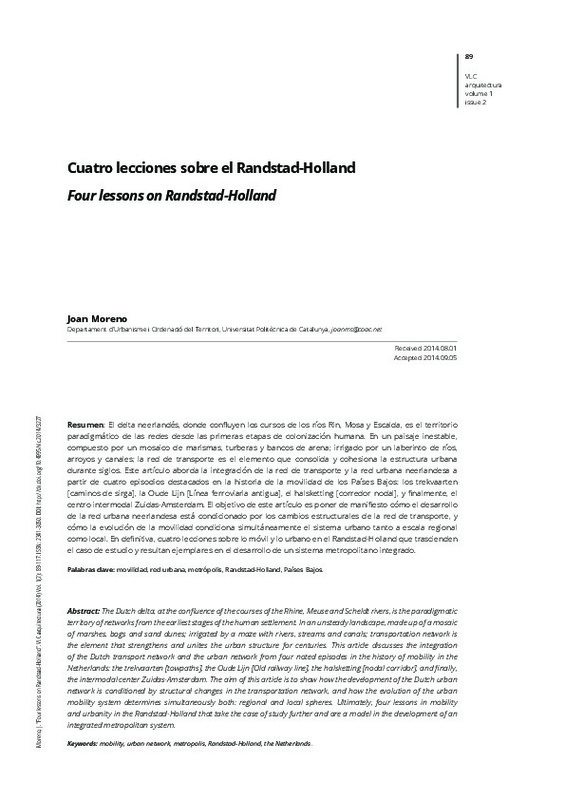|
Resumen:
|
[EN] The Dutch delta, at the confluence of the courses of the Rhine, Meuse and Scheldt rivers, is the paradigmatic territory of networks from the earliest stages of the human settlement. In an unsteady landscape, made up ...[+]
[EN] The Dutch delta, at the confluence of the courses of the Rhine, Meuse and Scheldt rivers, is the paradigmatic territory of networks from the earliest stages of the human settlement. In an unsteady landscape, made up of a mosaic of marshes, bogs and sand dunes; irrigated by a maze with rivers, streams and canals; transportation network is the element that strengthens and unites the urban structure for centuries. This article discusses the integration of the Dutch transport network and the urban network from four noted episodes in the history of mobility in the Netherlands: the Trekvaarten [towpaths], the Oude Lijn [Old railway line], the Halsketting [nodal corridor], and finally, the intermodal center Zuidas-Amsterdam. The aim of this article is to show how the development of the Dutch urban network is conditioned by structural changes in the transportation network, and how the evolution of the urban mobility system determines simultaneously both: regional and local spheres. Ultimately, four lessons in mobility and urbanity in the Randstad-Holland that take the case of study further and are a model in the development of an integrated metropolitan system.
[-]
[ES] El delta neerlandés, donde confluyen los cursos de los ríos Rin, Mosa y Escalda, es el territorio paradigmático de las redes desde las primeras etapas de colonización humana. En un paisaje inestable, compuesto por un ...[+]
[ES] El delta neerlandés, donde confluyen los cursos de los ríos Rin, Mosa y Escalda, es el territorio paradigmático de las redes desde las primeras etapas de colonización humana. En un paisaje inestable, compuesto por un mosaico de marismas, turberas y bancos de arena; irrigado por un laberinto de ríos, arroyos y canales; la red de transporte es el elemento que consolida y cohesiona la estructura urbana durante siglos. Este artículo aborda la integración de la red de transporte y la red urbana neerlandesa a partir de cuatro episodios destacados en la historia de la movilidad de los Países Bajos: los trekvaarten [caminos de sirga], la Oude Lijn [Línea ferroviaria antigua], el Halsketting [corredor nodal], y finalmente, el centro intermodal Zuidas-Ámsterdam. El objetivo de este artículo es poner de manifiesto cómo el desarrollo de la red urbana neerlandesa está condicionado por los cambios estructurales de la red de transporte, y cómo la evolución de la movilidad condiciona simultáneamente el sistema urbano tanto a escala regional como local. En definitiva, cuatro lecciones sobre lo móvil y lo urbano en el Randstad-Holland que trascienden el caso de estudio y resultan ejemplares en el desarrollo de un sistema metropolitano integrado.
[-]
|








